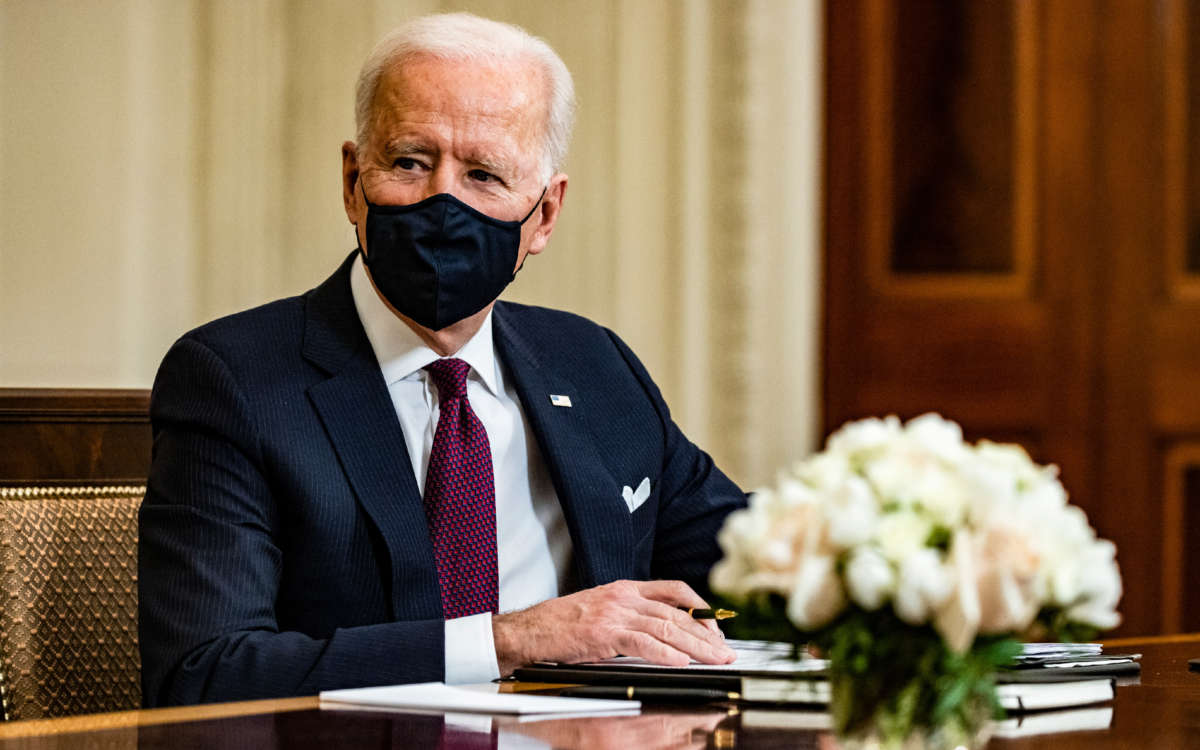Support justice-driven, accurate and transparent news — make a quick donation to Truthout today!
President Joe Biden signed two executive orders on Monday to address gender equality in the United States and to rescind a series of Trump-era changes that critics say diminished the ability of women to hold aggressors accountable.
The announcement of the two orders was made on Sunday evening during a call between administration officials and reporters. The signing of the two orders on Monday will coincide with International Women’s Day on March 8.
“The full participation of all people, including women and girls, across all aspects of our society is essential to the economic well-being, health, and security of our country and of the world,” one senior administration official said during the call.
One of the orders establishes a Gender Policy Council within the White House. The council will focus on combating bias and discrimination, and addresses a breadth of issues, ranging from sexual harassment, wage and wealth gaps, to the needs of families with children.
“The White House Gender Policy Council will be an essential part of the Biden-Harris administrations plan to ensure we build a more equal and just society, aggressively protecting the rights and unique needs of those who experience multiple forms of discrimination, including people of color and lesbian, gay, bisexual, transgender and queer people,” the senior official added.
The council will be required to produce a plan for how it will advance such goals as well as an annual report for the president to demonstrate its progress, the executive order signed by Biden states.
A second order calls for a review of changes to Title IX protections that were made under the Trump administration by former Education Secretary Betsy DeVos. Those changes, announced in May 2020, strengthened due process rights for those accused of sexual harassment or assault in schools and college campuses across the nation.
Critics, including the American Civil Liberties Union, contended at the time that the changes by DeVos would “inflict significant harm” onto victims and undermine their own civil rights. Women’s rights groups also suggested that the changes unjustly narrowed the definition of sexual harassment itself, and would deter women from coming forward about violence they suffered.
The order regarding DeVos’s rules will not immediately alter or end them. Rather, it will require the Department of Education, within 100 days of Biden’s signature, to review the changes DeVos implemented, and to come up with new ideas to replace them, a process that could take a considerable amount of time.
Administration officials said that the two orders sought to restore the U.S. “as a champion for gender equity and equality.” The U.S. lags behind many other nations, including several wealthy countries across the globe, when it comes to gender equality.
The announcement of the executive orders comes at a time when public attention to rape culture and the ubiquity of workplace sexual harassment is once again in the news due to multiple allegations of sexual harassment recently made against New York Gov. Andrew Cuomo. This latest move by the Biden administration on sexual harassment also evokes unanswered questions about whether Democrats and progressive activists plan to demand more accountability from the president in response to sexual assault allegations made against Cuomo and those made against Biden by Tara Reade in 2020, which most Democrats sought to downplay during the run-up to the election.
The most recent Gender Gap Report published by the World Economic Forum in December 2019 found that the U.S. ranked 53rd in the world in terms of its equal and equitable treatment of women. The U.S. ranked just above Singapore, Romania and Mozambique.
A terrifying moment. We appeal for your support.
In the last weeks, we have witnessed an authoritarian assault on communities in Minnesota and across the nation.
The need for truthful, grassroots reporting is urgent at this cataclysmic historical moment. Yet, Trump-aligned billionaires and other allies have taken over many legacy media outlets — the culmination of a decades-long campaign to place control of the narrative into the hands of the political right.
We refuse to let Trump’s blatant propaganda machine go unchecked. Untethered to corporate ownership or advertisers, Truthout remains fearless in our reporting and our determination to use journalism as a tool for justice.
But we need your help just to fund our basic expenses. Over 80 percent of Truthout’s funding comes from small individual donations from our community of readers, and over a third of our total budget is supported by recurring monthly donors.
Truthout’s fundraiser ended last night, and we fell just short of our goal. But your support still matters immensely. Whether you can make a small monthly donation or a larger one-time gift, Truthout only works with your help.
